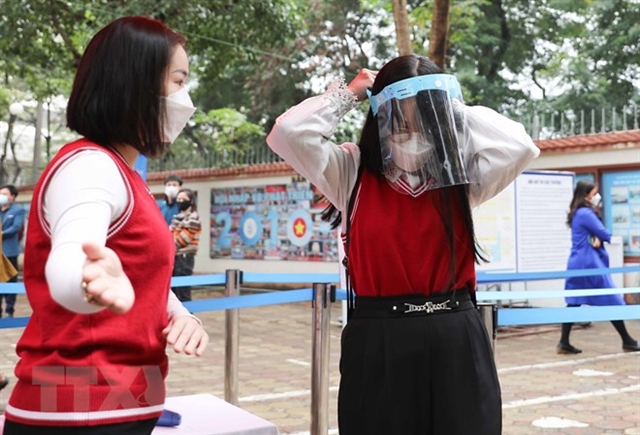 Society
Society


|
| A school re-opening drill at Giảng Võ Secondary School in Hà Nội's Ba Đình District on January 22. As part of the drill, a student with a high body temperature is instructed to the school's isolation area for further health monitoring. — VNA/VNS Photo Thanh Tùng |
HÀ NỘI — Parents in Hà Nội are applauding a decision by the municipal People’s Committee to reopen schools for grades 7 to 12 from February 8.
Students have been studying online for more than eight months due to the pandemic.
Bùi Tiến Dũng, a father in Long Biên District, said that the city had taken cautious steps in reopening schools.
“Caution was necessary when students were not fully vaccinated against the COVID-19. However, it’s different now,” he said.
“After the Tết holidays is the right time for children to go back to school,” he said, adding that adults have returned to work and can go to public places, so children should too.
“Children also need to adapt and live safely with the pandemic," Dũng said.
Phạm Huy Quân from Ba Đình District said that he agreed with the decision, though he thinks that it would be better if parents had options to choose from.
“If parents agree, they will let their children go to school. Some parents will still be concerned and they should be able to let their children continue to study online at home,” he said.
“Children 12 and older have been fully vaccinated and have had enough time to achieve high levels of antibodies. Moreover, the Department of Health and Department of Education and Training also have detailed instructions on the prevention and control of COVID-19 at schools, with solutions to handle arising situations. Localities and schools have also organised pandemic prevention drills. It’s time to reopen schools - children can't stay at home forever", Quân shared.
Nguyễn Minh Liên, a mother in Hoàng Mai District, said that she was also in favour of letting students back to school.
However, she thinks it is necessary to change the criteria for assessing COVID-19 risk levels.
“Students living in areas with low risk of COVID-19 infection (labelled yellow) are allowed to back to school. When their areas turn orange, or high risk, they must move back to online studying. This lack of stability affects both schools and families. The psychology of the children will be affected too", Liên said.
Lê Phan from Hà Đông District said that it was not reasonable to decide to reopen schools based on risk level assessments.
“If we rely on the risk level assessment, I have to wait to see what colour my district is – which is announced on weekends - to arrange my family activities,” he said.
“The shift between in-person learning and online learning sounds flexible and smooth, but in fact, the gap in quality of these two learning forms is still large,” he said.
According to the director of Hà Nội Department of Education and Training, Trần Thế Cương, the department completed the rehearsal to be ready to welcome students back to school after Tết.
“In-person learning will help boost the interaction between teachers and students and help students to absorb lessons more smoothly,” he said, calling for co-operation from parents and students to ensure the “5K" message of the Ministry of Health and other disease preventive measures are followed.
Trần Nguyễn Thái An, a student of Nghĩa Tân Secondary School in Cầu Giấy District, said that she was a little bit worried after hearing schools would return after Tết.
“Returning to school means that I will have to get up earlier, have breakfast earlier and wear a uniform. I haven't had to do those things for a long time,” she said.
“I am looking forward to going to school to meet friends and teachers, but I don't know what to talk about. It may take time for me to get used to in-person learning and testing as we have studied and taken online tests three terms," said Thái An.
According to Doctor of Psychology Nguyễn Thi Kim Quý from Việt Nam Association of Psychological Science and Education, secondary school/ high school students are the ages for forming and developing, affirming their personality.
As their movement and communication were limited, they will face many risks, she said, adding that staying at home and being exposed to computers and smartphones for too long would make the students gradually "lose" their emotions.
Other mental and physical health consequences were anxiety, depression, emotional disturbances, vulnerability, or irritability. Many students are at risk of diseases such as myopia, obesity, scoliosis and calcium deficiency, Quý said.
Phạm Thị Hương, a teacher of Nghĩa Tân Secondary School, said that after one semester of online learning, she found many of her students to be less talkative.
“In online classes, we – teachers and students – mostly talk about the content of lessons as we hardly have time for other issues,” Hương said.
“Observing students' facial expressions through the camera, it is impossible to know what they are thinking, what they want or whether they understand the lesson or not. Teachers also do not understand the changes in students' thoughts and feelings. Moreover, with 45 minutes for a lesson, teachers can't just "catch mistakes" when students are distracted and lack focus. If we are in a physical class, teachers could do more for students, ” said Hương.
“Depending on students ages, parents need to make different preparations for the return to school. The most important thing is to create 'positive thinking' about returning to school.
With a positive attitude, it will be easier to adjust and help children into new habits, and it will be easier to learn and adapt to new daily routines", said Đào Hồng, a teacher at Nghĩa Tân Secondary School. — VNS




